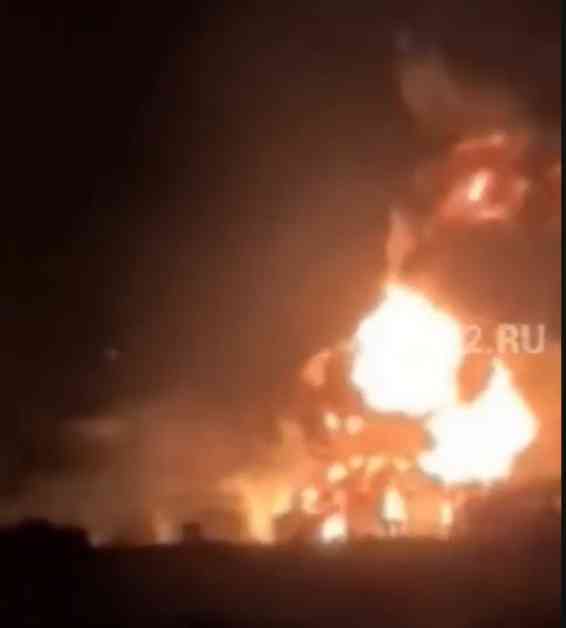The Ryazan oil refinery in Russia has been forced to cease all operations in the wake of an attack by Ukrainian drones on February 24th, as reported by three sources within the industry to Reuters. This deliberate strike on Russian oil processing facilities is part of a larger strategy by Ukraine to disrupt supply lines and logistical support for the Russian forces occupying their territory. The intensity of these attacks has escalated significantly in early 2025, with a notable increase in long-range drone strikes targeting Russian fuel facilities.
The primary target of the attack was the main crude distillation unit, CDU-6, at the Ryazan refinery, which caught fire during the assault, leading to a complete shutdown of oil processing activities at the plant. This unit alone represents nearly half of the facility’s total refining capacity, signifying the extent of the damage caused by the strike. Owned by Rosneft, the Ryazan refinery processed 13.1 million tons (262,000 barrels per day) in 2024, contributing to almost 5% of Russia’s overall refining throughput.
The impact of the attack extended beyond the immediate disruption of operations at the refinery, with at least five explosions reported in the vicinity of the facility, according to confirmations from Ukraine’s military. Pavel Malkov, the governor of Ryazan Oblast, acknowledged the incident and mentioned that falling debris from the destroyed drones initiated a fire at an industrial site in the region, although specific details were not provided.
In light of the damage sustained by the CDU-6 unit, there are hopes that the refinery might be able to partially resume operations in the coming days by activating its CDU-4 and CDU-3 prime distillation units while repairs are carried out on the main unit. These backup units have a combined refining capacity of approximately 145,000 barrels per day, making up a significant portion of the plant’s total refining capabilities.
This recent attack marks the third drone strike on the Ryazan refinery in the current year, with a similar incident occurring last year as well. Despite these challenges, the facility had managed to partially resume operations earlier in February after a previous attack, showcasing resilience in the face of adversity. The ongoing conflict between Ukraine and Russia continues to have far-reaching consequences, with each drone strike further disrupting the delicate balance of oil production and supply in the region.
Expert Analysis on the Impact of Drone Strikes on Russian Oil Refineries
As the conflict between Ukraine and Russia intensifies, the strategic targeting of Russian oil facilities through drone strikes raises concerns about the long-term implications for the global oil market. Experts in the energy sector warn that continued disruptions to Russia’s oil production and refining capabilities could have ripple effects on the international supply chain, potentially leading to price volatility and supply shortages.
According to industry analysts, the repeated drone attacks on key Russian oil refineries like the one in Ryazan highlight the vulnerability of critical infrastructure to modern warfare tactics. The use of drones for precision strikes on oil facilities underscores the evolving nature of conflicts in the 21st century, where traditional energy assets are increasingly becoming targets in geopolitical disputes.
The resilience of the Ryazan refinery in the face of multiple drone attacks is a testament to the adaptability and preparedness of the industry to navigate challenging circumstances. However, the frequency and intensity of these assaults underscore the need for enhanced security measures and risk mitigation strategies to safeguard vital energy infrastructure in conflict zones.
As geopolitical tensions continue to escalate, the energy sector remains a focal point for strategic maneuvering and asymmetric warfare tactics. The ability of oil-producing nations to protect their critical assets from drone strikes and other forms of unconventional attacks will be crucial in ensuring the stability and security of global energy supplies in the years to come.

















